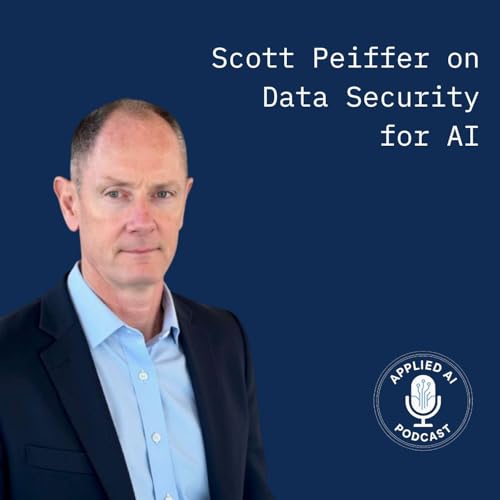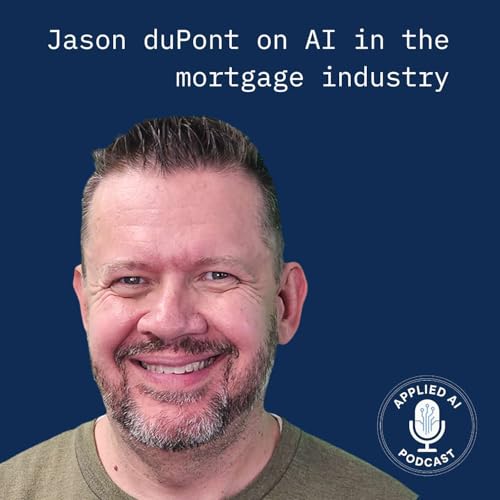
The Applied AI Podcast
カートのアイテムが多すぎます
カートに追加できませんでした。
ウィッシュリストに追加できませんでした。
ほしい物リストの削除に失敗しました。
ポッドキャストのフォローに失敗しました
ポッドキャストのフォロー解除に失敗しました
-
ナレーター:
-
著者:
-
Jacob Andra
このコンテンツについて
A hype-free zone to discuss the practical applications of artificial intelligence and machine learning technologies to real-world use cases in business, government, nonprofits, and other types of organizations. Calibrated to business executives who want to know, "What does AI mean for my industry and my company," it keeps the emphasis on value creation and actionable strategies.
The Applied AI Podcast is produced by Talbot West, a leading digital transformation consultancy and AI enablement partner for mid-market and enterprise companies. Jacob Andra, CEO of Talbot West, brings in-the-trenches insights from real companies implementing AI and machine learning technologies. Additionally, Talbot West clients, partners, and other executives feature prominently in our guest line-up.
With real-world experience and a wealth of applied AI perspectives, The Applied AI Podcast avoids both the hype and the nay-saying surrounding AI technologies. We cover the actual value creation that AI is driving in enterprise, as well as the risks, pitfalls, and limitations. We bring you a balanced view. Just like Talbot West clients trust us to be their digital transformation advisor, our listeners trust The Applied AI Podcast to be a bias-free, no-nonsense zone.
Learn more at https://appliedaipod.com
Learn about Talbot West at https://talbotwest.com
Learn about BizForesight (an AI-powered M&A platform from Talbot West): https://bizforesight.com
Learn about the Talbot West AI 2030 Thesis and our vision of total organizational intelligence: https://talbotwest.com/ai-insights/the-talbot-west-5-year-ai-thesis
Learn about Cognitive Hive AI (CHAI), Talbot West's modular, composable ensemble architecture: https://talbotwest.com/ai-insights/what-is-cognitive-hive-ai-chai
Learn about AI Prioritization and EXecution (APEX), Talbot West's methodology for prioritizing AI initiatives: https://talbotwest.com/ai-insights/apex-framework-for-ai-prioritization
Read Talbot West's response to the August 2025 Wall Street Journal article on how McKinsey is adapting to AI: https://talbotwest.com/ai-insights/wsj-mckinsey-talbot-west
Read how Talbot West approaches the "buy vs build" question with our clients: https://talbotwest.com/ai-insights/ai-buy-vs-build
Read Talbot West's description of composable AI and why it's the future: https://talbotwest.com/services/cognitive-hive-ai/composable-ai
How AI is driving value creation in M&A: https://talbotwest.com/industries/mergers-and-acquisitions-manda/how-ai-makes-mergers-and-acquisitions-more-efficient
Why a system-of-systems approach is the future of AI deployment: https://talbotwest.com/ai-insights/system-of-systems-in-ai
An examination of the DoD's Modular Open Systems Approach (MOSA) and its implications for AI deployment: https://talbotwest.com/industries/defense/what-is-mosa-in-defense-systems
Ways AI can make government more efficient: https://talbotwest.com/industries/government/how-can-ai-make-government-more-efficient
Examining the importance of explainability in AI and why it doesn't exist with commercial large language models but does with Cognitive Hive AI: https://talbotwest.com/services/ai-governance/what-is-explainability-in-ai
Let's not forget about small language models: https://talbotwest.com/ai-insights/what-is-a-small-language-model-slm
Where AI change management often fails: https://talbotwest.com/services/change-management-for-ai-implementation/understanding-change-management-in-ai
-
 32 分
32 分カートのアイテムが多すぎます
ご購入は五十タイトルがカートに入っている場合のみです。カートに追加できませんでした。
しばらく経ってから再度お試しください。ウィッシュリストに追加できませんでした。
しばらく経ってから再度お試しください。ほしい物リストの削除に失敗しました。
しばらく経ってから再度お試しください。ポッドキャストのフォローに失敗しました
ポッドキャストのフォロー解除に失敗しました
-
 39 分
39 分カートのアイテムが多すぎます
ご購入は五十タイトルがカートに入っている場合のみです。カートに追加できませんでした。
しばらく経ってから再度お試しください。ウィッシュリストに追加できませんでした。
しばらく経ってから再度お試しください。ほしい物リストの削除に失敗しました。
しばらく経ってから再度お試しください。ポッドキャストのフォローに失敗しました
ポッドキャストのフォロー解除に失敗しました
-
 2025/09/1641 分
2025/09/1641 分カートのアイテムが多すぎます
ご購入は五十タイトルがカートに入っている場合のみです。カートに追加できませんでした。
しばらく経ってから再度お試しください。ウィッシュリストに追加できませんでした。
しばらく経ってから再度お試しください。ほしい物リストの削除に失敗しました。
しばらく経ってから再度お試しください。ポッドキャストのフォローに失敗しました
ポッドキャストのフォロー解除に失敗しました



